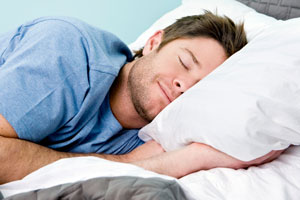Insomnia & Sleep Problems
Home > A-Z of Conditions Treated by an Acupuncturist > Insomnia & Sleep Problems
Insufficient sleep can make us feel tired and irritable and adversely affect our concentration during the day
 Chronic sleep problems can lead to chronic health problems. Studies suggest that inadequate sleep may adversely affect our immune system. Many of the major restorative functions in the body like muscle growth, tissue repair, protein synthesis, and growth hormone release occur predominantly or only during sleep.
Chronic sleep problems can lead to chronic health problems. Studies suggest that inadequate sleep may adversely affect our immune system. Many of the major restorative functions in the body like muscle growth, tissue repair, protein synthesis, and growth hormone release occur predominantly or only during sleep.
There are different kinds of Insomnia:
- Difficulty falling asleep (sleep-onset insomnia) – the most common type
- Waking up in the night and not being able to get back to sleep
- Waking up too early in the morning and not being able to get back to sleep
- Not feeling refreshed after sleep
Almost everyone has problems sleeping at some point in their lives. Possible causes:
- During or after stressful situations such as money or work worries, or death of a loved one.
- Psychological problems, such as anxiety, panic disorder or PTSD, Post-traumatic Stress Disorder.
- Underlying physical problems such as IBS, fibromyalgia, arthritis, hyperactive thyroid, respiratory or urinary problems, chronic pain.
- Use and misuse of drugs such as alcohol, nicotine, caffeine and recreational drugs or medicines
The first step in treating insomnia is to determine the underlying cause. For short term insomnia your GP will advise you on good sleep habits and, if lack of sleep is severely affecting you during the day, you may be prescribed a short course of sleeping pills. Sleeping pills can help provide relief from the symptoms in the short term but do not address the underlying cause. If you have long-term insomnia, cognitive behavioural therapy may also be recommended.
Acupuncture for Insomnia
In clinical research trials, acupuncture for insomnia appears to be at least as effective as existing conventional drugs without the side effects and should be considered as one of the therapeutic options for insomnia.
Acupuncture may specifically benefit people with insomnia by:
- Increasing production of nocturnal melatonin, a hormone believed to regulate sleep
- Stimulating natural opioids which reduce anxiety and pain
- Promoting normal function of brain tissues
- Calming sympathetic nervous activity, promoting relaxation
- Altering the brain’s mood chemistry to calm and reduce tension
See also:
Treating Insomnia
 “Many of my patients report that they sleep better after acupuncture. Subsequently they feel less tired and more energised. For those suffering from insomnia, acupuncture can help provide the impetus to help develop positive sleep patterns. Patients say this can make a huge difference to their health and quality of life. Following an intensive programme of acupuncture for chronic insomnia over a period of weeks, one of my patients went to for a regular check up with his GP for long term hypertension and weight problems. He discovered that both his blood pressure and weight had come down significantly. They were both amazed at the results.”
“Many of my patients report that they sleep better after acupuncture. Subsequently they feel less tired and more energised. For those suffering from insomnia, acupuncture can help provide the impetus to help develop positive sleep patterns. Patients say this can make a huge difference to their health and quality of life. Following an intensive programme of acupuncture for chronic insomnia over a period of weeks, one of my patients went to for a regular check up with his GP for long term hypertension and weight problems. He discovered that both his blood pressure and weight had come down significantly. They were both amazed at the results.”
Research Fact Sheets
For more information see the British Acupuncture Council Research Fact Sheet below.
Testimonials
“I first went to Judy because the joints in my fingers were becoming arthritic and painful.
I now have no pain or swelling in my hands, and am in really good health, which I put down to regular ‘top up’ acupuncture appointments. Also, my blood pressure is exemplary, unusual for someone like me who enjoys food and wine – this is apparently an acknowledged result of acupuncture.
Over the years Judy has successfully treated me for plantar fasciitis, neuralgia, hair loss, knee pain and bad sleep patterns. She is extremely knowledgeable about diet as well as the philosophy and practice of acupuncture, and as she has a scientific background as well as her long and thorough training, I feel that her treatments are to be trusted on all levels.
Treatments start with a massage, a double whammy as it feels wonderful as well as kickstarting the body, ready for the acupuncture.
i can’t recommend Judy enough. You come out of her clinic feeling that not only have you been helped physically, but that you have now got someone who has listened to and thought about your condition, and is on your side on the journey to improve it.”
“I went to see Judy because of insomnia and trouble with sleeping. I had never had acupuncture before and was amazed and delighted with the improvement it made. It is wonderful to be able to sleep properly through the night again. Thank you Judy. I very much appreciate the difference you have made.”
“Hi Judy, Thank you for a great treatment yesterday, I slept better last night than I have done in months, even slept through my alarm which is unheard of!”
“Hi Judy. Just wanted to say how amazing I felt after acupuncture yesterday. I had the best night’s sleep too. Thank you so much for an incredible treatment.”
“Dear Judy. I just wanted to thank you for the help you have given me through acupuncture. I hadn’t slept properly for a night for the last 15 years, and since the treatment over the past six months I am now getting at least seven hours sleep a night. I have to admit that I was very sceptical about this treatment and it really was “the last chance saloon” but my wife talked me in to it, and I am now happy to recommend acupuncture to anyone.”
“After one session of acupuncture, my sinus problem cleared, and after 3 sessions, my sciatic pain was nearly gone. I continue to receive acupuncture once a month because it helps with my general well-being and keeps me healthy. Acupuncture also helped me cope with my husband’s recent illness. My husband also has acupuncture – he recently suffered a stroke. He has Parkinson’s Disease and suffers with hot sweats. Acupuncture helps him with these problems too. I would recommend that therapy [acupuncture] to any one as the needles are painless and it’s very rewarding.”
“Overworked, overtired, washed out and ‘grey’ – that’s how I was when I came to see Judy. My long term sinus problems and asthma had not responded to any of the various treatments my private medical insurance had offered and I was running out of options. Judy’s careful and expert attention has produced dramatic results in a very short time. I sleep better, I no longer take any medication, and have much more energy and vitality. People keep telling me how well I look! I highly recommend Judy to anyone looking for another option to get well again.”



